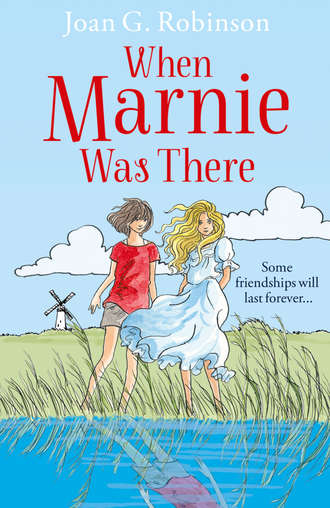
Полная версия
When Marnie Was There
She turned quickly and glanced at Wuntermenny, but he was looking along the staithe towards the landing place and had seen nothing.
Anna ran home, turned the corner of the lane, then stopped. Mrs Pegg and Sandra’s mother were standing talking at the cottage gate – their faces brick red in the orange light of the sunset. Mrs Stubbs was a big woman with bright black eyes and a rasping voice. Anna did not want to meet her again, so she stepped back into the dusky shadow of the hedge, and waited.
“You’ll be coming over to mine tonight, won’t you?” Mrs Stubbs was saying. “My sister’s over from Lynn and she’s brought them patterns.”
“Has she now!” Mrs Pegg sounded eager, then hesitated. “Well, there’s the child –” she added doubtfully.
“Oh, I forgot about her! She’s a bit of an awkward one, ain’t she? My Sandra said—” the voice was lowered and Anna missed the rest of the sentence.
“Yes, well – maybe…” said Mrs Pegg, “but I don’t hold with interfering between children. If they don’t want to make friends, then let ’em alone, I’d say.”
“My Sandra was quite willing,” said Mrs Stubbs. “Put on her best dress, she did, and her new petticoat, but she says to me after, ‘Mum,’ she says. ‘Never did I see such a stiff, plain thing—’”
“Yes, well,” Mrs Pegg interrupted mildly, turning towards the gate, “don’t tell me what she said, for as true as I’m standing here, I’d rather not know.” She closed the latch with a click. “Any road, she’s as good as gold with us,” she added – defiantly now she was inside the gate. “But perhaps we won’t come tonight and thank you all the same for asking.”
“Just as you please,” said Mrs Stubbs. “Shall you be at the Bingo tomorrow night?”
“Yes, that’s right. I’ll see you at the Bingo tomorrow,” said Mrs Pegg, and went indoors.
Anna waited until Mrs Stubbs had gone, then slipped in by the back door. Mrs Pegg was bustling about, fetching bread and butter from the pantry. She looked a little flushed and her hair was untidy but she greeted Anna as usual.
“Ah, there you are, lass! Sit you down now. Tea’s just ready.” She turned to Sam as he put down his paper and drew up a chair. “What’s on telly tonight?” she asked.
Sam looked surprised. “Weren’t you going up to the Corner tonight? I thought Mrs Stubbs said her sister was there?”
Mrs Pegg shook her head. “Not tonight. That can wait.” She glanced at Anna, then said, “Listen, love, next time you see Mrs Stubbs or Sandra, try and be a bit friendly-like, will you?”
Anna blurted out, “Is it because of me you’re not going?”
“Of course not, what an idea!” Mrs Pegg made a good pretence of looking surprised. “Only maybe they’ll ask you up to theirs one day, if you look friendly-like. That might make a bit of a change for you, eh?”
Anna mumbled, “I like it better here,” but Mrs Pegg might not have heard because she was again asking Sam what was on the telly.
“Boxing,” he said, looking slightly guilty, “but you won’t like that.”
“Oh, well,” said Mrs Pegg, “I’ll like it tonight and lump it. And that’ll make a bit of a change too.”
“It will and all!” said Sam, chuckling and turning to wink at Anna. “She’ll never look at boxing, no matter what I say—” But Anna had gone.
Upstairs in her room she sat on the edge of her bed, hating herself and hating everyone else. It was her fault that Mrs Pegg wasn’t going to the Stubbs’ tonight. Sandra, that fat pig of a girl, had called her a stiff, plain thing. Mrs Pegg – kind Mrs Pegg – hadn’t wanted to listen and she had said she was as good as gold. But she wasn’t going to the Stubbs’ because of Anna, and that was stupid. She was silly and stupid. So was Sam, with his silly boxing. And as for Mrs Stubbs—! Mrs Pegg should have gone anyway, then Anna wouldn’t have felt so guilty. She looked at the framed sampler on the wall and hated that too. Hold fast that which is Good – but nothing was good. Anyway what did it mean? Was the anchor supposed to be good? But you couldn’t walk about holding an anchor all day long, even if you had one. You’d look sillier than ever.
She turned the picture to the wall and went over to the window. Kneeling on the floor she looked out across the fields, pink in the glow of the sunset, and let hot, miserable tears run down her face. Nothing was any good – Anna least of all.
For a moment she almost wished she was at home, then she remembered all the misery of that last half term before she came away. No, it was better here.
She knelt there, listening to the now familiar country sounds; voices from the fields, the distant rattle of farm machinery, and the roar of the last bus from Barnham as it came tearing down the hill and disappeared along the coast road. Then there was silence – only the odd cry of a bird from the marsh, and little ticking sounds that she could never quite identify. At night the silence fell like a blanket. When a dog barked you could hear it from one end of the village to the other.
Gradually, as the tears dried on her cheeks and the fields darkened, and the quietness became even quieter, she forgot about Mrs Pegg not going to the Stubbs’, and thought instead about the girl she had seen in The Marsh House. Why had she been having her hair brushed? It had been too early for bedtime. She had been wearing something light, surely not a nightdress so early in the evening? She had not been a very little girl. She had looked about the same age as Anna…
The thought struck her that the girl would have been dressing for a party. Yes, that was it. She would have been standing there in her petticoat, having her hair brushed, with a white party dress laid out on the bed nearby, and a pair of slippers on the floor – silver slippers. And now, with dusk already falling, she would be coming down the central staircase into the hall. There would be bright lights and there would be dancing…
Kneeling quite still by the open window, Anna sank into a dream, seeing it all as if she herself were there – not inside, but watching from the footpath outside. Through the narrow side window she could see the bright dresses passing and repassing. The faces of the people were vague, but she could tell they were laughing. Then all at once she saw them turn one way, to watch the fair-haired girl as she came down the great staircase, stepping carefully in her silver slippers.
And now, it seemed to Anna, she was farther away. She was standing on the marsh on the far side of the water, and seeing the lights from the windows reflected in the creek, a wavering pattern of gold. The sound of music came over the water, only faintly and mingling with the soughing of the wind in the marram grasses…
So clearly did she see it all in her imagination that she felt it must be true – must be happening now. Getting to her feet she closed the window, then, stiff with kneeling so long, and trembling, partly with cold and partly with excitement, she limped softly across the room and downstairs. As she slipped out of the door she heard the shouts and roars of the television boxing match going on in the kitchen, and marvelled how grown-ups could spend an evening watching anything so dull.
She hurried down to the creek, running barefoot, her ears straining for the sounds of the music, her eyes straining to catch a glimpse of the lights which by now she felt sure would be spreading right across the creek. Then she turned the corner and stopped dead.
The creek was in darkness, the cottages and the boathouse were in darkness, and along where The Marsh House stood, only the black background of trees showed up against the sky. There was not a light anywhere, except for the distant revolving beam of a lightship which made an arc of light across the sky every half minute, then disappeared. There was no music either, only the soft lapping of water against the sides of the boats, and the sudden, feverish rattling of rigging slapping against masts…
She stood there for a moment, amazed. Then from far across the marsh came the mad, scary, scatter-brained cry of a peewit, and she turned and fled back to the cottage.
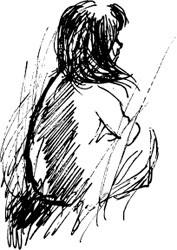
Chapter Seven
“—AND A FAT PIG”
THAT WAS SILLY, Anna thought next morning. Because she had been miserable about the way things really were, she had tried to make something imaginary come true instead. But that never worked.
She went down to breakfast thinking she would try and make it up to Mrs Pegg for missing her outing, by being helpful in some way.
“Shall I wash up?” she asked casually, standing beside her at the sink after breakfast.
“Lord no, my duck! That’s kind of you, but I’m used to it.” Mrs Pegg seemed touched, and a little surprised. “I’ll tell you what, though. You can do something for me. Pick me some sanfer when you’re down on the marsh, and on your way back pop in and ask Miss Manders if she’s any spare jam jars. If she has, get some vinegar as well. Sam’s a fancy to have some pickled sanfer again.”
The Peggs always called samphire “sanfer”, so Anna knew what she meant. She set off with the big, black plastic shopping bag and went down to the creek.
It was one of those still, grey, pearly days, with no wind, when sky and water seemed to merge into one, and everything was soft and sad and dreamy. Sam had said at breakfast that in weather like this his rheumatics were like Old Nick screwing the pincers on him, but Anna liked these days better than any. They seemed to match the way she was feeling.
The tide was out, and she paddled across to the other side without even turning to look at the old house. There was a purple haze over the marsh, which was the sea lavender coming out, and she thought she might pick some of that, too, when she had finished with the samphire.
For two hours she slithered about on the marsh, jumping over the streams, sometimes landing on springy turf and sometimes sinking into soft patches of black mud; hearing only the distant cry of the little grey-brown birds calling “Pity me! Oh, pity me!” from a long way off. The samphire was green and juicy, though it only tasted of sea salt, she thought. She picked until the bag was full, then, deciding to leave the sea lavender for another day, she set off towards the Post Office.
Miss Manders looked at Anna over her spectacles and gave her a thin, tight smile. Anna gave her Mrs Pegg’s message, hearing, at the same time, someone come in behind her. Out of the corner of her eye she saw that it was Sandra and another girl.
“—and Mrs Pegg says if you can spare the jam jars, please can she have some vinegar as well,” she finished, aware that the two girls were looking at her sideways and that Sandra was whispering. The younger girl burst into a peal of laughter, then there was some shushing and quiet scuffling behind her.
When Miss Manders had gone out at the back to find the jars, Anna turned round with every intention of looking friendly, if she could. But try as she would she could not catch Sandra’s eye. She was now standing with her back to Anna, pretending to look at some postcards in a rack, and talking to her friend in a low voice. Again the other girl laughed, half glancing over her shoulder at Anna. Then Sandra, looking into a crate of ginger beer bottles, said loudly in an affected voice, “Ho, and hif you ’ave any old bottles to spare, kindly fill them with ginger beer, will you?”
They both laughed immoderately at this, and Anna stood there feeling awkward, but she was determined to make Sandra look at her. She walked over towards her, intending to say “Hello,” but at that minute Miss Manders came back.
“Tell Mrs Pegg I have got some,” she said to Anna, “but I’ll have to look them out later. They’re away at the back.”
Anna said, “Thank you,” and moved towards the door. Then she remembered the vinegar. She went back and stood uncertainly behind the two girls, waiting while Miss Manders served them with two ice-cream wafers. Then the telephone rang, and Miss Manders, thinking Anna was only waiting for the others, shut the till and went to answer it. Sandra turned round and faced Anna.
“Why are you following me about?” she demanded.
“I’m not.”
“Yes, you are. Wasn’t she?”
The other girl nodded, licking delicately round the edges of her ice-cream. Sandra put out her tongue and kept it out, staring hard at Anna, then, very slowly and deliberately, without shifting her gaze, she lifted her ice-cream and ran it down the sides of her tongue.
Anna stared back, noting with pleasure that the ice-cream from the lower end of the wafers was about to dribble down the front of Sandra’s dress. But she showed no sign.
“I was only going to say hello—” she began coldly, but Sandra interrupted before she could finish her sentence.
“Go on, then, call me, call me!”
“What do you mean, call you?”
“Call me what you like. I don’t care! I know what you look like, any road.” She turned and whispered to her companion, giggling, and the blob of ice-cream fell trickling down her dress.
Anna looked at her scornfully. “Fat pig,” she said, and turned to go out.
But Sandra barred her way. She had just seen the ice-cream on her dress and was scrubbing at it furiously. “Now I’ll tell you!” she said, spluttering. “Now I’ll tell you what you look like! You look like – like just what you are. There!”
This startled Anna. She walked out of the Post Office – quite forgetting the vinegar – with all the appearance of not having heard, but knowing that Sandra had dealt her an underhand blow. Like “just what you are” she had said. But what was she?
Angrily she walked down the lane, tearing at the poppies in the hedgerow, and crumpling them in her hot hand until they became slimy. She knew what she was only too well. She was ugly, silly, bad tempered, stupid, ungrateful, rude… and that was why nobody liked her. But to be told so by Sandra! She would never forgive her for that.
She left the bag of samphire behind the outhouse, and went in to dinner looking sulky.
Mrs Pegg did not know yet about her meeting Sandra, but she would hear soon enough. Mrs Stubbs would make sure of that. She would tell her that Anna had called Sandra a fat pig – and this after Mrs Pegg had specially said “try and look friendly”! Anna prepared herself in advance for the moment when Mrs Pegg should hear about it, by looking surly and answering all her kindly questions in monosyllables.
“Ready for your dinner, love?”
“Yes.”
“Liver today. Do you like that?”
“Quite.”
“What’s up, my duck. Got out of bed the wrong side after all, did you?”
“No.”
“Never mind, then. You like bacon too – and onions?”
“Yes.”
Mrs Pegg hovered beside her with the frying pan. “A please don’t hurt no-one neither,” she said a little tartly.
“Please,” said Anna.
“That’s a maid! Now sit you down and enjoy that. Maybe you’ll feel better after.”
Anna ate her meal in silence, then got up to go. Sam reached out a hand as she passed his chair. “What ails you, my biddy?”
“Nothing.”
She ignored the hand, pretending not to see it, but in that instant she longed to flop down on the floor beside him and tell him everything. But she could not have done that without crying, and the very idea of such a thing appalled her. Anyway they would miss the point somehow. Mrs Preston always did. She was always kind, but also she was always so terribly concerned. If only there was someone who would let you cry occasionally for no reason, or hardly any reason at all! But there seemed to be some conspiracy against that. Long ago in the Home, she remembered, it had been the same. She could not remember the details, only a picture of herself running, sobbing across an enormous asphalt playground, and a woman as big as a mountain – as it had seemed to her then – swooping down on her in amazement, crying, “Anna! Anna! What ever are you crying for?” As if it had been a quite outrageous thing to do in that happy, happy place.
All this passed through Anna’s mind as she passed Sam’s chair and went through into the scullery to put her empty plate into the sink. On no account must she cry. It would be too silly to say she was upset because she had called Sandra a fat pig. Or because Sandra had said she looked like just what she was. It was not just that, anyway. Mrs Pegg was going to hate her as soon as she heard about it, so it would be unfair to let her go on being kind now, not knowing.
She hardened her heart and went out by the back door, slamming it behind her.
The tide was far out and the creek a mere trickle. She glanced along the staithe towards The Marsh House, wondering if she might catch a glimpse of the girl she had seen last night, but there was no-one there. The house seemed asleep. She crossed the creek and walked over the marsh, paddling across the creek again on the far side, and came to the beach. There, with only the birds for company, she lay in a hollow in the sandhills all the long, hot afternoon, and thought about nothing.
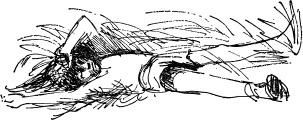
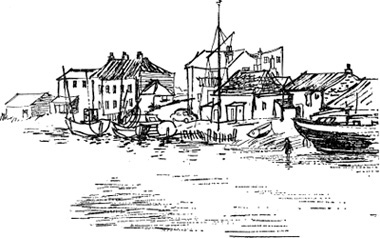
Chapter Eight
MRS PEGG’S BINGO NIGHT
IT WAS MRS Pegg’s Bingo night. Anna had forgotten until she came back several hours later to find Mrs Pegg already changed into her best blouse, and rummaging in the dresser drawer for a small pot of vanishing cream which she kept there for special occasions.
“Your tea’s keeping hot over the saucepan,” she said to Anna. “Turn off the gas when you’ve finished, there’s a good lass. Sam’s up to the Queen’s Head for a game of dominoes, so he had his early with me. Now where’s that pot of cream gone? It really do seem like vanishing cream sometimes. Ah, there it is!” She pulled it out from among an assortment of kettle holders, paper bags and tea cloths, and began dabbing her face haphazardly. “Now where are me shoes? I could have swore I brought them down. You won’t forget to turn the gas off, will you, love? I’d better go and find me shoes.” She lumbered off to find another pair.
Anna was glad. No-one had been bothering about her. No-one had been wasting their time worrying whether she was happy or not. Her bad temper of dinner-time had been forgotten. Now Bingo and dominoes were in the ascendant. The Peggs were like that; they really did forget, not just pretend to. So she, too, was free – free to cut herself right off from them. From the Peggs, the Stubbs, and everyone else. It was a relief not to feel she was being watched and worried over all the time… In any case, by tomorrow Mrs Pegg would probably have heard all about her meeting with Sandra… When Mrs Pegg came hobbling back in her best shoes (which were exactly the same as her ordinary ones, only tighter), Anna was looking out of the window. And when Mrs Pegg finally went to the door, saying, “Well, I’m off at last, my duck. Make yourself some tea if you’ve a mind,” she only glanced round and said, “Goodbye” in a polite, formal voice.
And now Anna was alone. The clock ticked on the dresser, and the saucepan on the stove bubbled gently. She discovered her “tea” – a mountain of baked beans alongside a kipper, and a sticky iced bun – and ate through it solemnly, still wrapped around in this quiet, untouchable state of not-caring. Then she turned off the gas, put the dishes on the draining board, and went out again.
It was dusk and the tide had come in. It must have come in very quickly while she was having her tea, for the staithe was now covered with a smooth sheet of silvery water, which came up to within a few feet of the bank. A small boat was tied to a post, floating in shallow water barely a foot from the shore. It had not been there before, she was sure. She could not have failed to notice it lying on its side as it would have been then, and so far up on the beach. It was a beautiful little boat, almost new and the colour of a polished walnut.
She went closer and looked inside.
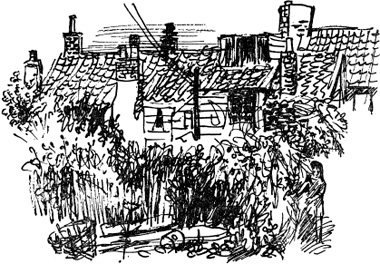
A silver anchor lay in the bow, its white rope neatly coiled, and a pair of oars were lying ready in the rowlocks. It looked as if someone had just stepped ashore and would be back any minute. She looked round quickly but there was no-one to be seen. Nor had anyone come up the road for at least the last ten minutes. If they had, Anna would have seen them. And yet, more and more, she had the feeling that the boat was waiting for someone; not just lying idle like the others. After all, it was not moored, the anchor was still in the bow, and the rope was only twisted twice round the post. It almost seemed as if it might be waiting for her.
She glanced round again, took off her plimsolls and then, without pausing to think, pulled the boat towards her and stepped inside. The sudden movement tugged at the rope and loosened it. Anna sat down, pulled it in, and took hold of the oars. She had never rowed a boat before in her life – though she did remember once taking an oar with Mr Preston when they had been in Bournemouth, and she remembered, too, the golden rule he had impressed upon her about never standing up in a boat – but beyond that she had no experience at all. And yet now she felt perfectly confident.
Carefully she dipped one oar, then the other, then both together in small quiet strokes, and found herself moving steadily away from the post and along the shore. She was moving along towards The Marsh House. Almost without realising it she had turned the boat in that direction.
It was utterly calm and dreamlike on the water. She forgot to row and leaned forward on the oars, looking at the afterglow of the sunset, which lay in streaks along the horizon. A sandpiper – was it a sandpiper? – called, “Pity me!” from across the marsh, and another answered, “Pity me! Oh, pity me!”
She sat up suddenly, realising that although she had stopped rowing she was still moving. The bank to her left was slipping away fast, and already she was drifting past the front of The Marsh House. She saw lights in the first-floor windows, then she made a sudden grab for the oars. Over her shoulder she had just seen that she was heading straight for the corner where the wall jutted out into the water. If she was not quick she would bump into it. She plunged the left oar into the water, hoping to turn the boat, but the oar went in flat and she nearly fell over backwards. At the same moment a voice sounded almost in her ear – a high, childish voice with a tremble of laughter in it.
“Quick! Throw me the rope!”
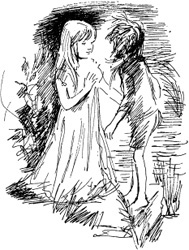
Chapter Nine
A GIRL AND A BOAT
ANNA THREW THE rope, felt the jerk as it tightened, and the boat was drawn in until it bumped gently against the wall.
She looked up. Standing above her, at the top of what she now saw was a flight of steps cut into the wall, was a girl. The same girl as she had seen before. She was wearing a long, flimsy dress, and her fair hair fell in strands over her shoulders as she bent forward, peering down into the boat.


